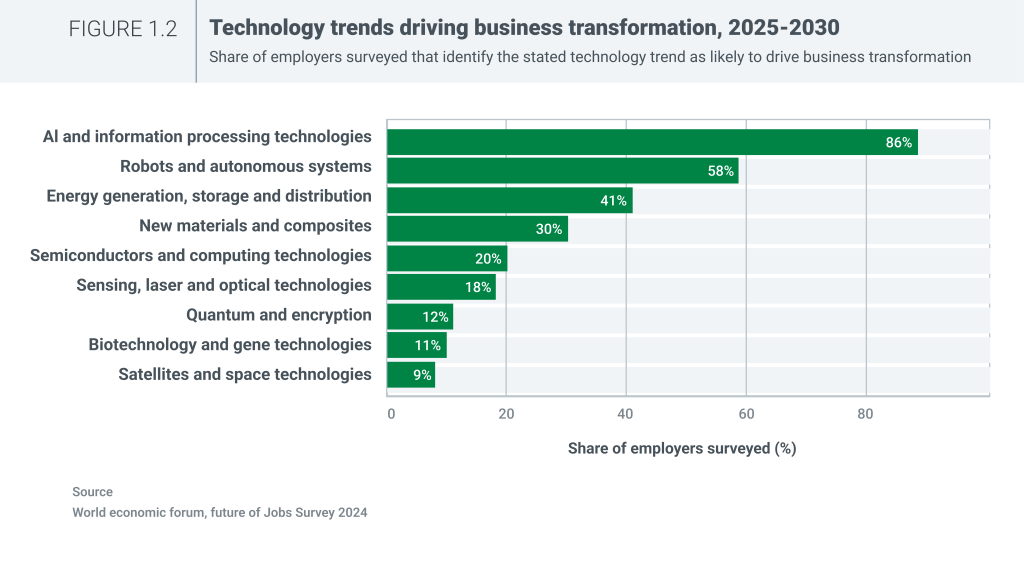The World Economic Forum (WEF) has published its Future of Jobs Report 2025. This barometer of trends across all sectors anticipates challenges and opportunities for growth until 2030. Key takeaways include the imperative for a flexible workforce that is prepared to upskill in line with technological advances.
Over 1,000 employers contributed insights into evolving technological, societal and economic trends to inform this latest report. Together they represent some 14 million workers across 22 industry clusters and 55 economies around the world.

Saadia Zahidi, WEF Managing Director
Saadia Zahidi, WEF Managing Director, commented: “Transformational breakthroughs, particularly in generative artificial intelligence (GenAI), are reshaping industries and tasks across all sectors. These technological advances, however, are converging with a broader array of challenges, including economic volatility, geoeconomic realignments, environmental challenges and evolving societal expectations.”
Future of Jobs Report Insights Can Help Workers Plan Ahead
The Future of Jobs Report 2025 helps employers identify potential opportunities and pitfalls. Employees, students and those seeking a change of career can use its insights to plot a path or make adjustments to their plans for the future.
As a trusted free online empowerment platform, Alison supports WEF’s ambition to equip employers and individuals to meet the challenges of the next five years, grasp opportunities and thrive. Our 5,500+ course library grows every week. To date, Alison has equipped more than 45 million learners across 193 countries to remain competitive in the job market, enhance their skills, and achieve career growth and development.
Alison CEO Mike FeerickFounder, Mike Feerick, explains: “Education underpins all social progress. Our aim is to harness technology to make all education and skills training available to anyone, anywhere for free.”
Below, we explore some of the WEF Report’s highlights and Alison’s role in supporting its aims.
Three Major Trends
The report highlights the top 3 factors affecting economies worldwide: the growth of technology, the rising cost of living and climate change.
1. The Technology Trend
“Broadening digital access is expected to be the most transformative trend,” according to the report, with 60% of employers anticipating major changes to their business by 2030. 
AI Makes an Impact
Within the technological advances, the burgeoning artificial intelligence field has caught the attention of 86% of employers surveyed. WEF notes the top three fastest-growing skills up to 2030 are expected to be AI and big data, networks and cybersecurity and technological literacy.
Consequently, the fastest-growing jobs in percentage terms include Big Data Specialists, Fintech Engineers, AI and Machine Learning Specialists, and Software and Application Developers. Robotics and autonomous systems engineers will also be in demand.
Alison is home to over 1,000 courses on all aspects of IT. Click on the links for courses for:
- Big Data Specialists
- Fintech Engineers
- AI and Machine Learning Specialists
- Software Developers
- Application Developers
- Networking Specialists
- Cybersecurity Specialists
- Programmers
Technological Literacy
In the modern workforce, almost every job requires some understanding of the digital world. Alison empowers beginners with digital literacy courses which cover the basics of navigating the internet safely and securely. There are also multiple free online AI training courses catering to businesses and individuals interested in generating content through prompt engineering.
For detailed insights into the role of AI in today’s world, enrol in the Introduction to Artificial Intelligence (AI) – IBM experts explain how AI works, examine the ethical implications and discuss the breakthroughs and future of this era-defining technology.
Our platform also caters to specific sectors such as Project Management, Supply Chain and Logistics, Education and Human Resource Management wanting to avail of AI’s benefits.
The table below indicates how technological advances stand to impact business. WEF expects these trends to have a divergent effect on jobs, driving both the fastest-growing and fastest-declining roles, and fueling demand for technology-related skills.

2. Cost of Living
The second trend or factor of note, according to WEF, is the rising cost of living accompanied by general economic slowdown, set to cost 1.6m jobs worldwide. Here, human skills take precedence over automation. “These two impacts on job creation are expected to increase the demand for creative thinking and resilience, flexibility, and agility skills,” notes WEF.
The report finds that analytical thinking remains the most sought-after core skill with three-quarters of companies surveyed considering it as essential in 2025. Leadership skills and social influence are also in demand.
Such skills can be bolstered by training. With Alison, learners can explore multiple courses on:
- Analytical Thinking
- Creative Thinking
- Resilience
- Emotional Intelligence
- Decision Making
- Leadership Skills
- Influence
Registration is free and certifications are accredited by the independent UK organisation CPD.
3. Climate-change mitigation
Mitigating the effects of climate change is a priority for 47% of employers, while 41% rank adapting to climate change as important. Consequently, WEF identifies renewable energy engineers, environmental engineers and electric and autonomous vehicle specialists among the 15 fastest growing jobs. Environmental stewardship enters the Future of Jobs Report’s list of top 10 fastest growing skills for the first time.
With Alison’s support, individuals can master the science behind climate change, develop environmental management skills or pursue a career in the green energy sector.
As the battle to mitigate the impact of climate change intensifies, individuals advance in environmental stewardship through online courses on climate action and sustainable development.

Click the links for courses for:
Meeting the Demands of a Rapidly Changing World
In conclusion, the WEF’s Future of Jobs Report 2025 paints a clear picture of a rapidly transforming world of work, driven by technological advancements, economic shifts, and the urgent need to address climate change.
Education underpins all social progress. Our aim is to harness technology to make all education and skills training available to anyone, anywhere for free.” Mike Feerick, Alison.com.
By embracing lifelong learning and focusing on the in-demand skills highlighted in the report – from AI proficiency and digital literacy to creative thinking, resilience, and environmental stewardship – individuals can not only navigate these changes but thrive in them.
Alison’s comprehensive library of free online courses provides a crucial resource for upskilling and reskilling, empowering learners to seize the opportunities of tomorrow and shape a brighter future for themselves and the global workforce.
*The World Economic Forum (WEF) Future of Jobs Report 2025 project team is Till Leopold, Attilio Di Battista, Ximena Játiva, Shuvasish Sharma, Ricky Li and Sam Grayling, alongside the wider team at the Centre for the New Economy and Society.
Read the full report or the report digest.
Frequently Asked Questions
Q: What are the most significant trends shaping the future of work according to the WEF Future of Jobs Report 2025?
A: The report highlights three major trends impacting the global economy and the job market: the rapid advancement and integration of technology (especially AI), the rising cost of living coupled with economic slowdown, and the urgent need for climate change mitigation and adaptation. These trends are reshaping industries, creating new job roles, and requiring workers to adapt and acquire new skills to remain competitive.
Q: What specific skills are identified as crucial for success in the future job market, and how can individuals acquire them?
A: The report emphasizes a blend of technical and human skills. On the technical side, AI and big data, cybersecurity, and technological literacy are highly sought after. Human skills like analytical and creative thinking, resilience, flexibility, leadership, and social influence are also critical. Platforms like Alison offer a wide range of free online courses that can help individuals develop these skills, from AI and software development to leadership training and environmental stewardship. Lifelong learning and continuous upskilling are essential for staying relevant in the evolving job market.
Q: How does the WEF Future of Jobs Report 2025 connect with Alison’s mission and resources?
A: The WEF report underscores the importance of accessible education and skills training to empower individuals to navigate the changing world of work. This aligns perfectly with Alison’s mission to provide free, high-quality education and skills training to anyone, anywhere. Alison’s extensive library of over 5,500 courses covers many of the in-demand skills identified in the report, including AI, digital literacy, leadership, and sustainability. By offering these resources for free, Alison helps individuals equip themselves with the knowledge and skills needed to thrive in the future job market and contribute to a more inclusive and prosperous future.








